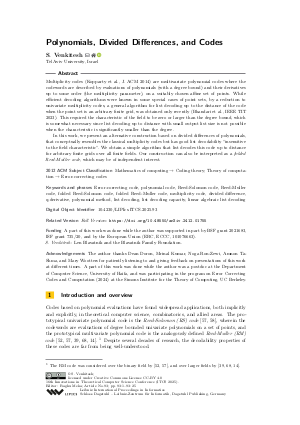LIPIcs.ITCS.2025.93.pdf
- Filesize: 1 MB
- 25 pages

 Creative Commons Attribution 4.0 International license
Creative Commons Attribution 4.0 International license

Multiplicity codes (Kopparty et al., J. ACM 2014) are multivariate polynomial codes where the codewords are described by evaluations of polynomials (with a degree bound) and their derivatives up to some order (the multiplicity parameter), on a suitably chosen affine set of points. While efficient decoding algorithms were known in some special cases of point sets, by a reduction to univariate multiplicity codes, a general algorithm for list decoding up to the distance of the code when the point set is an arbitrary finite grid, was obtained only recently (Bhandari et al., IEEE TIT 2023). This required the characteristic of the field to be zero or larger than the degree bound, which is somewhat necessary since list decoding up to distance with small output list size is not possible when the characteristic is significantly smaller than the degree. In this work, we present an alternative construction based on divided differences of polynomials, that conceptually resembles the classical multiplicity codes but has good list decodability "insensitive to the field characteristic". We obtain a simple algorithm that list decodes this code up to distance for arbitrary finite grids over all finite fields. Our construction can also be interpreted as a folded Reed-Muller code, which may be of independent interest.















Feedback for Dagstuhl Publishing